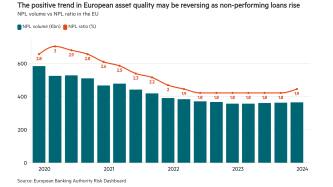Success has it drawbacks. As Portugal slowly emerges from an economic recession and struggles to reduce the biggest budget deficit in the EU, banks have found themselves under attack for achieving strong profit growth while the rest of the country is being asked to make sacrifices.
Critics, mainly from the political left, say banks should be paying more taxes. Claims that fees and commissions are too high have led to heated debates on television and new regulations that will, for example, limit the charge for transferring a mortgage account to a maximum of 0.5% of the loan.
Not surprisingly, bankers and economists believe these political commentators and media pundits have picked the wrong target. Rather than attacking banks for being too profitable, they say, they should be holding them up as an example of success that other sectors of the Portuguese economy would do well to emulate.
Carlos Andrade, chief economist with Espírito Santo Research, says: “Portuguese banks have adjusted well to the downturn by cutting costs, improving efficiency and turning their attention to other markets with higher growth rates than Portugal.”
The way forward
“More importantly, they have achieved success by their openness to international competition, which has forced them to perform to the most exacting standards. This is the right way forward for the Portuguese economy as a whole,” he adds.
Success has also not been without its disappointments for the centre-left government of prime minister José Sócrates. Since taking office two years ago, it has implemented a series of structural reforms and succeeded in cutting the budget deficit from 6.8% of gross domestic product (GDP) in early 2005 to 3.9% at the end of last year. At the same time, economic growth has outperformed expectations, reaching 1.3% in 2006, up from 0.5% the previous year, on the back of a 9.1% jump in exports.
Central bank governor Vitor Constâncio says: “To reduce the budget deficit to the official 2006 target of 4.6% was already a very demanding objective. To cut it back to 3.9% went beyond the government’s own forecast and was a very welcome surprise. This makes a good starting point for achieving the rest of the programme, which now looks much more feasible than it did a year ago.”
Under a stability programme agreed with the European Commission, Portugal aims to bring the deficit below the eurozone ceiling of 3% of GDP in 2008.
However, the government’s fiscal success has so far failed to convince international credit rating agency Standard & Poor’s to raise Portugal’s sovereign debt rating, after downgrading it from AA to AA- during the budget deficit crisis of 2005.
Rating constraints
In March, S&P said Portugal’s ratings remained constrained by “weak public finances, low economic growth potential and the level of reform required to put the fiscal accounts on a sustainable footing”. The government, it added, was unlikely to bring the deficit below 3% of GDP before 2009.
Fernando Teixeira dos Santos, Portugal’s finance minister, acknowledges that it is easier to lose than to regain the confidence of rating agencies. But he remains committed to, and confident of, achieving the 3% deficit target next year and believes the international perception of the Portuguese economy is beginning to change for the better.
“Government policy is clearly focused on correcting our fiscal imbalances on a sustainable basis and I think we are gradually gaining international recognition for the results we are achieving,” he says. “Last year, international forecasts for the Portuguese economy were more pessimistic than our own. But this April, the International Monetary Fund’s forecasts, for example, were broadly aligned with ours. This is a sign of greater trust and confidence that is reassuring.”
The IMF sees economic growth in Portugal reaching 1.8% this year and 2.1% in 2008, with the unemployment rate falling from 7.7% last year to 7.3% within two years. Unlike S&P, it expects the budget deficit to fall to 2.6% of GDP next year, a projection that Mr Teixeira dos Santos and his government colleagues will find particularly heartening.











